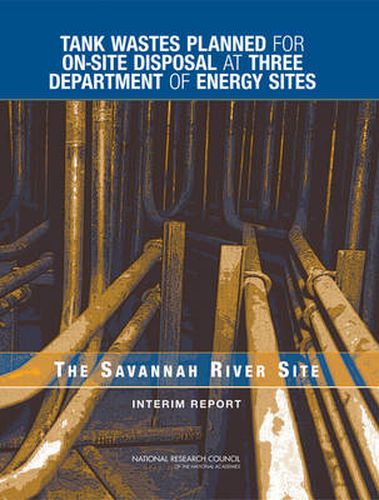Readings Newsletter
Become a Readings Member to make your shopping experience even easier.
Sign in or sign up for free!
You’re not far away from qualifying for FREE standard shipping within Australia
You’ve qualified for FREE standard shipping within Australia
The cart is loading…






In response to a request from Congress, the U.S. Department of Energy (DOE) asked the National Academies to evaluate its plans for managing radioactive wastes from spent nuclear fuel at sites in Idaho, South Carolina, and Washington. This interim report evaluates storage facilities at the Savannah River Site in South Carolina, with a particular focus on plans to seal the tanks with grouting. The report finds that tanks at the site do not necessarily need to be sealed shut as soon as the bulk of the waste has been removed. Postponing permanent closure buys more time for the development and application of emerging technologies to remove and better immobilize residual waste, without increasing risks to the environment or delaying final closure of the tank farms. The report also recommends alternatives to address the lack of tank space at the site, as well as the need for focused R&D activities to reduce the amount and improve the immobilization of residual waste in the tanks and to test some of the assumptions used in evaulating long-term risks at the site.
$9.00 standard shipping within Australia
FREE standard shipping within Australia for orders over $100.00
Express & International shipping calculated at checkout
In response to a request from Congress, the U.S. Department of Energy (DOE) asked the National Academies to evaluate its plans for managing radioactive wastes from spent nuclear fuel at sites in Idaho, South Carolina, and Washington. This interim report evaluates storage facilities at the Savannah River Site in South Carolina, with a particular focus on plans to seal the tanks with grouting. The report finds that tanks at the site do not necessarily need to be sealed shut as soon as the bulk of the waste has been removed. Postponing permanent closure buys more time for the development and application of emerging technologies to remove and better immobilize residual waste, without increasing risks to the environment or delaying final closure of the tank farms. The report also recommends alternatives to address the lack of tank space at the site, as well as the need for focused R&D activities to reduce the amount and improve the immobilization of residual waste in the tanks and to test some of the assumptions used in evaulating long-term risks at the site.